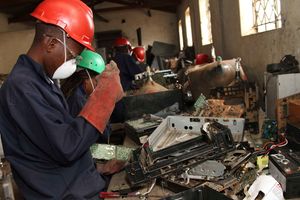Allow us to take part in Climate Summit, children plead with Ruto

H.E. President William Ruto addressing the COP 27 meeting on ON BEHALF OF THE AFRICAN GROUP AND KENYA AT THE 27th CONFERENCE OF PARTIES (COP 27) TO THE UNITED NATIONS FRAMEWORK CONVENTION ON CLIMATE CHANGE (UNFCCC).
What you need to know:
- “When the world gets hotter and the weather gets crazy, we can get sick more easily, have trouble breathing because of bad air, and get sick from bugs that move because of the changing climate. Our bodies are not as strong as grown-ups' and changes in nature can easily make us sick,” said Kiama, a seven-year-old child from Nairobi.
More than 300 children from Kenya and 200 from Lesotho have written to President William Ruto seeking participation in the Africa Climate Summit. This was after officials at the African Climate Summit reportedly trimmed down the capacity of the children’s pavilion from 500 children to 100.The children said they are equally affected by climate change.
“Mr President, my name is Maryanne (10), a child journalist. I would love to attend the Africa Climate Summit so that I practise what my friends and I have been learning, telling our own climate stories through our own eyes,” said the journalist at Mtoto News, a digital and media platform whose mission is to make children visible.
“When the world gets hotter and the weather gets crazy, we can get sick more easily, have trouble breathing because of bad air, and get sick from bugs that move because of the changing climate. Our bodies are not as strong as grown-ups' and changes in nature can easily make us sick,” said Kiama, a seven-year-old child from Nairobi.
She also wants President Ruto to know that problems brought about by the climate crisis are messing up their learning and how they make friends. “Floods, storms or fires can make us leave our schools and homes for a long time and this makes it hard for us to learn. Families that already don't have enough food and water because of droughts will have an even harder time taking care of their children,” Kiama said.
“When bad things happen, families might have to move and this can make us more likely to be treated badly and lose our friends and support. Seeing these climate and environmental problems around us and not knowing what will happen makes us feel really scared and sad. We are anxious and upset,” he added.
In their official letter to President Ruto, the young ones jointly highlighted the importance of letting children attend and be part of climate change meetings.
“First, we will have to deal with the problems caused by climate change when we grow up. So, letting us be part of these meetings helps us to be part of finding solutions. Second, children have great ideas and see things in a fresh way, which means that if we are included in the summit, then there will be lots of different ideas for solving climate problems,” they said.
The children further reminded that leaders around the world had promised and committed to include them in climate change discussions and meetings.
“Having children at the Africa Climate Summit is also a promise that grown-ups made. It's part of the United Nations Convention on the Rights of the Child, which says that children should be involved in things that affect them. The upcoming summit can give children a chance to talk about their worries, ideas and hopes,” the children told President Ruto.
“As children, we believe in a better world for us all and having us involved at the summit will give us a chance to talk with adults. When adults and children work together, we can make better plans to handle climate problems now and in the future,” the letter reads.
Another group of children from Lesotho have also written to President Ruto with the same grievances.
“We are a group of children and youths born in the Kingdom of Lesotho, ranging between the ages of seven-18. We believe that our flora and fauna is what makes Lesotho and Africa at large to be what it is and if we are not environmentally conscious, we might obliviously harm our environment and natural resources,” the children from Lesotho told President Ruto in their official letter seen by Climate Action.
“Attending the African Climate Summit will equip us with skills, knowledge and techniques on how we can develop innovations that do not increase the scaring levels of climate change. It will help us, as children and the future generation of Lesotho and Africa, to lead an eco-friendly life that will inspire others to contribute to combating the effects of climate change and help decrease its alarming levels. The effects of climate change can be felt by almost everyone, especially in Africa where we are faced with poverty and food insecurity,” they said.
Jennifer Kaberi, a child development specialist and consultant on children’s programmes, told Climate Action that children’s inclusion in the Africa Climate Summit is imperative for several crucial reasons.
“First, young people are not just bystanders, but inheritors of the consequences of climate change. Their futures will be disproportionately affected by the decisions made today and by involving them, the summit acknowledges their stake in a sustainable future and empowers them to contribute solutions.
“Secondly, children often possess a unique perspective on environmental issues. Their unfiltered outlook can highlight overlooked concerns and innovative solutions and so including them ensures a diverse range of voices, fostering creativity and inclusivity in shaping climate policies,” she said.





